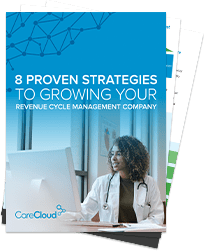The financial stability of any healthcare organization largely depends on revenue cycle management (RCM), which encompasses the processes involved in managing claims, payments, and revenue generation. Over the years, the healthcare industry has undergone a considerable transformation thanks to the adoption of automation and artificial intelligence (AI).
These technological advancements have revolutionized modern RCM, leading to a significant improvement in efficiency, accuracy, and revenue optimization. In this blog, we will delve deeper into how automation and AI are revolutionizing RCM and their impact on the healthcare industry.
The Traditional RCM Challenges
Before delving into the role of automation and AI, it’s essential to understand the challenges that have traditionally plagued RCM:
- Billing Errors: Manual data entry and coding can lead to costly billing errors, claim denials, and delayed payments.
- Regulatory Complexity: The healthcare industry is heavily regulated, with frequent changes in coding and compliance requirements, making it challenging for RCM teams to stay up-to-date.
- Revenue Leakage: Inefficient processes and a lack of real-time visibility into the revenue cycle can result in revenue leakage, impacting the financial status of healthcare organizations.
- High Administrative Costs: Manual administrative tasks, such as claim processing and eligibility verification, drive up operational costs.
Role of Automation in Revenue Cycle Management
- Claims Processing: Automation tools, such as robotic process automation (RPA) and optical character recognition (OCR), streamline the claims processing workflow by automatically extracting and validating patient information, reducing the risk of errors.
- Eligibility Verification: One of the benefits of AI-powered systems in the healthcare industry is their ability to swiftly verify a patient’s eligibility and insurance coverage. This feature significantly reduces the number of claim denials that occur due to eligibility issues, ensuring that patients receive the care they need in a timely manner.
- Prior Authorization: Advanced technological systems have the capability to simplify and accelerate the process of acquiring prior authorizations for medical procedures. By leveraging the power of automation, healthcare providers can efficiently navigate the complex web of insurance requirements, resulting in swift approvals and timely treatment for patients.
- Coding and Documentation: AI algorithms can assist medical coders by suggesting appropriate codes based on the physician’s documentation, improving coding accuracy.
- Predictive Analysis: Machine learning algorithms can analyze previous data to predict claim denials, enabling proactive intervention and preventing revenue loss.
- Patient Engagement: Automation tools can send automated appointment reminders, billing statements, and payment reminders to patients, improving collections and reducing bad debt.
Role of AI in Revenue Cycle Management
Predictive Analytics: The use of artificial intelligence (AI) in healthcare revenue cycle management (RCM) is becoming increasingly popular due to its ability to analyze large datasets and provide valuable insights. Predictive analytics, for example, uses AI to analyze patient payment behaviors, allowing healthcare organizations to target their collection efforts more effectively and improve cash flow.
Denial Management: Another way AI is being used in RCM is through denial management. AI can identify patterns in claim denials and help RCM teams understand the root causes of denials. With this knowledge, healthcare organizations can implement preventive measures to reduce the number of denied claims and improve revenue collection.
Fraud Detection: AI can also help healthcare organizations detect fraudulent activities in claims, reducing revenue loss due to fraud. By analyzing claim data using algorithms, AI can identify anomalies and potentially fraudulent activities. This helps healthcare organizations maintain financial stability and protect patients from financial harm.
Revenue Optimization: Revenue optimization is another area where AI is useful in healthcare RCM. AI-driven revenue cycle platforms provide insights into underutilized revenue streams, allowing healthcare organizations to maximize their earnings and improve their financial performance.
Chatbots and Virtual Assistants: Chatbots and virtual assistants powered by AI can assist patients with billing inquiries and payment arrangements. This improves the patient experience and streamlines the billing process for healthcare organizations.
Compliance and Reporting: AI can assist with compliance and reporting by tracking and reporting compliance with changing regulations. This helps healthcare organizations stay up-to-date on regulatory changes and avoid penalties.
Benefits of Automation and AI in RCM
- Improved Accuracy: Streamlined workflows and real-time eligibility verification can also lead to quicker claim approvals and payments, resulting in faster payments.
- Cost Savings: Automating processes can significantly reduce administrative overhead, lower operational costs, and enhance overall efficiency, leading to substantial cost savings.
- Faster Payments: Streamlined workflows and real-time eligibility verification can also lead to quicker claim approvals and payments, resulting in faster payments.
- Enhanced Patient Experience: Furthermore, automation can improve communication with patients, leading to better engagement and satisfaction, ultimately enhancing the patient experience.
- Data-Driven Insights: AI-powered analytics can provide data-driven insights that help healthcare organizations make informed decisions and optimize their revenue cycle, thereby increasing overall efficiency and profitability.
Conclusion
Automation and artificial intelligence are reshaping the landscape of revenue cycle management in the healthcare industry. By automating repetitive tasks, reducing errors, and providing valuable insights, these technologies are helping healthcare organizations improve efficiency, enhance revenue, and deliver a better patient experience.
As the healthcare industry continues to evolve, embracing automation and artificial intelligence in an effective RCM solution such as that offered by CareCloud will become increasingly crucial for financial success and compliance with ever-changing regulations.



